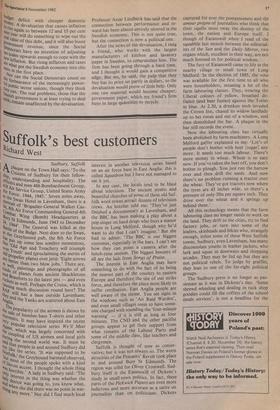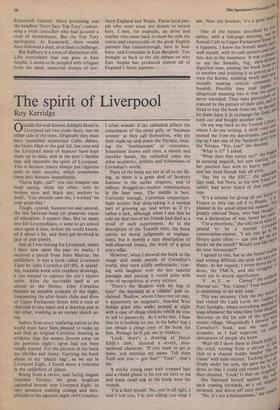'Suffolk's best customers
Richard West
Sudbury, Suffolk A Plaque on the Town Hall says: `To the sk, Citizens of Sudbury for their fellow- 07. understanding and hospitality. The 41 :e'er' and men 486 Bombardment Group, Air Service Group, United States Army ni2 Force. 1944, 1945.' Seven miles away, the e Dortr :-Avan Hotel in Lavenham, there is a Ile gait Of 'Brigadier-General Walker Cas- cc; 'in Air Force Commanding General 4th Obat Wing (Bomb) Headquarters at 247 St Edmunds, June 1943 to December 1944'. The General was killed at the at the of , tk the Bulge. Next door to the Swan, 11.1;"! Greyhound pub, the 8th Air Force
°P some less sombre mementoes,
over 'Old Age and Treachery will triumph old Youth' and (proclaiming the merits of at Propeller planes over jets): 'Eight screws ase better than two blow jobs.' There are, 14e11, Paintings and photographs of all and 3eas of Planes from ancient Shackletons rock uforts to the latest jets — and even ea„ ,ets as well. Perhaps the Cruise, which is 11:„Ig much discussion round here? The th7r' still has a base outside Lavenham; .c .y and the Yanks are scattered about East the ...,P0Pularity of the airmen is shown by an ''ue of bomber-base T-shirts and other Cerlivenirs. It may have inspired the recent DoloUlar television series We'll Meet the-117> Which was largely concerned with durie°11P11118 of US airmen and local girls saicing the second world war. It must be that
People in and around Sudbury did
No` at
the series. 'It was supposed to be
'but the Greyhound barmaid observed, of-ht 1110st of the people spoke with a kind was accent. I thought the whole thing ems horrible.' A lady in Sudbury said: 'The lady interest in the thing was whether the and lector was going to, you know what, chi8 any mo when she did there was no point in wat- -re.' Nor did I find much local
interest in another television series based on an air force base in East Anglia: this is called Squadron but I have not managed to see it yet.
In any case, the locals tend to be blasé about television. The ancient streets and beautiful churches of some of these old Suf- folk wool towns attract dozens of television crews. An hotelier told me: 'They've just finished a documentary at Lavenham, and the BBC has been making a play about a pop singer on hard drugs who buys a manor house in Long Melford, though why he'd want to do that I can't imagine.' But she had to admit: 'The BBC is our biggest customer, especially in the bars. I can't see how they can point a camera after the lunch-time session. The biggest boozers of all are the lads from Songs of Praise.
The interest in East Anglia may have something to do with the fact of its being the nearest part of the country to eastern Europe and therefore the site of our strike force, and therefore the place most likely to suffer retribution. East Anglia people are well aware of the threat. You see signs in the windows such as 'Air Raid Warden', and even small villages seem to have some- one charged with sounding the 'four-minute warning' — if it is still as long as four minutes. The CND and the other pacifist groups appear to get their support from what remains of the Labour Party and some of the middle class, like teachers and clergymen.
Suffolk is thought of now as conser- vative; but it was not always so. The worst atrocities of the Peasants' Revolt took place in and around Bury St Edmunds. The region was solid for Oliver Cromwell. Sud- bury itself is the Eatanswill of Dickens's study in small-town politics. In fact, these parts of the Pickwick Papers are even more ludicrous and more accurate as a satire on journalists than on politicians. Dickens
captured for ever the pompousness and tbe amour pro'pre of journalists who think that their squibs must sway the destiny of the town, the nation and Europe itself. I though of Eatanswill when I read of the squabble last month between the editorial- ists of the Sun and the Daily Mirror, two organs which, excellent in their way, are not much listened to for political wisdom.
The fury of Eatanswill came to life in the nearby village or small town of Long Melford. In the election of 1885, the vote was available for the first time to all who were householders, meaning a lot of the farm labouring classes. They, wearing the Liberal colours of yellow, breathed de- fiance (and beer fumes) against the Tories in blue. At 2.30, a drunken mob invaded the Crown Inn, chased its widow landlady up to her room and out of a window, and then demolished the bar. A plaque in the bar still records the event.
Now the labouring class has virtually been abolished by farm machinery. A Long Melford gaffer explained to me: 'Lot's of people don't bother with beet [sugar] any more. It needs too much labour. There's more money in wheat. Wheat is so easy now. If you've taken the beet off, you don't bother to plough. You just run the harrow over and then drill the seeds. And now there's no problem running a tractor over the wheat. They've got tractors now where the tyres are 43 inches wide, so there's a pressure of only 3lbs per square inch. They drive over the wheat and it springs up behind them.'
All this technology means that the farm labouring class no longer needs to work on the land. They drift to the cities, try to find factory jobs, or turn into some of the loafers, skinheads and bikies who, strangely enough, infest some of these West Suffolk towns. Sudbury, even Lavenham, has many disconsolate youths in leather jackets, who lurk and squat in doorways and shopping arcades. They may be fed up but they are not political rebels. To judge by graffiti, they lean to one of the far-right political groups.
The Sudbury press is no longer as pas- sionate as it was in Dickens's day. 'Some shrewd wheeling and dealing in tuck shop goodies could fill the coffers of the school meals services', is not a headline for the
Eatanswill Gazette. More promising was the headline 'Sorry Says Top Tory', concer- ning a local councillor who had accused a rival of drunkenness. But the Top Tory apologised. At Eatanswill, there would have followed a duel, or at least a challenge.
But Sudbury is a town of distinction still. Like everywhere that one goes in East Anglia, it seems to be peopled with refugees from the dead, industrial dumps of nor- them England and Wales. Those local peo- ple who went away are drawn to return here. I met, for example, an artist and teacher who came back to show his wife the towns and countryside of the great English painters like Gainsborough, here in Sud- bury, and Constable in East Bergholt. This brought us back to the old debate on why East Anglia has produced almost all of England's finest painters . . . .















































 Previous page
Previous page